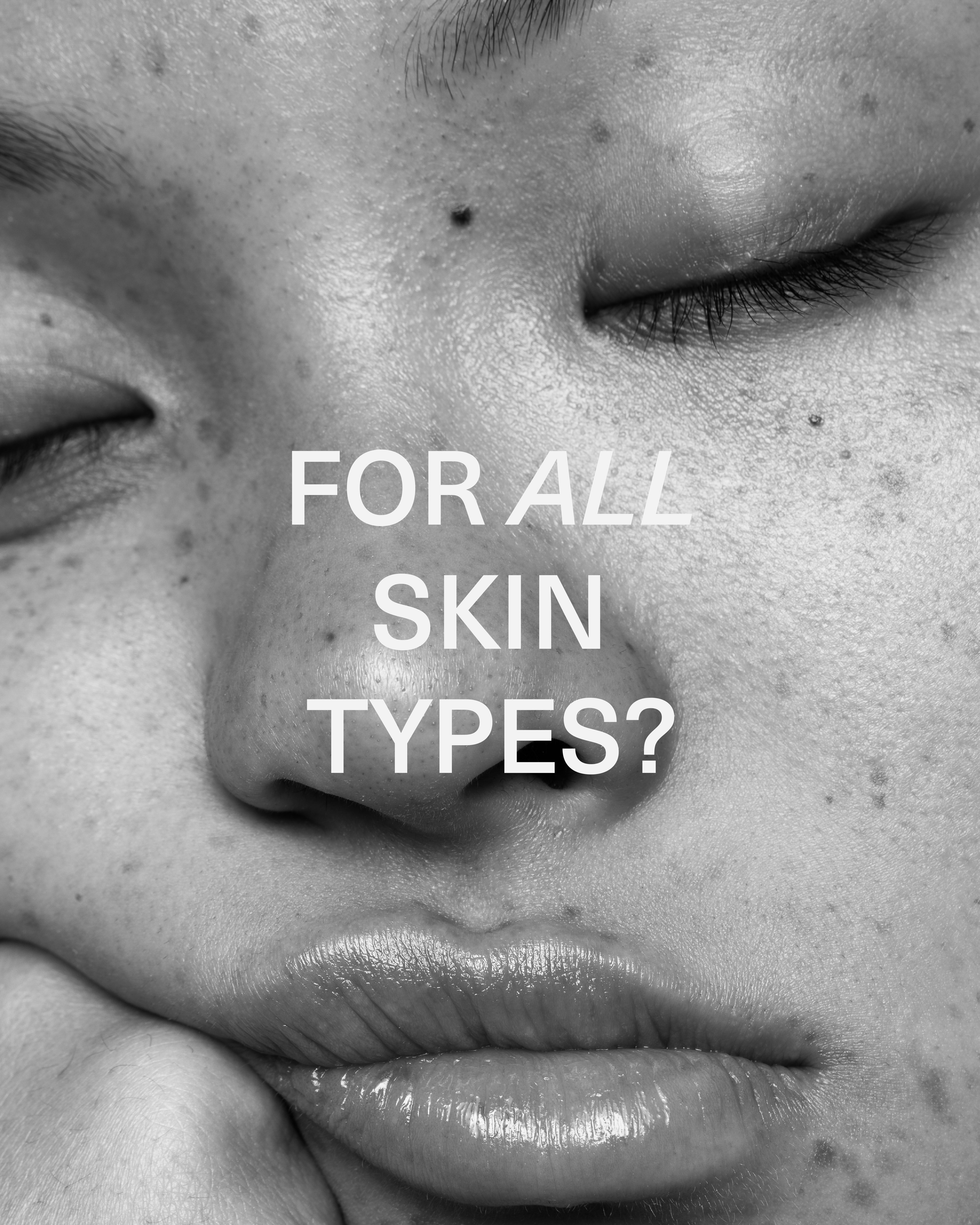For All Skin Types

The concept of "For All Skin Types" rarely translates well to the world of beauty, and skincare is no exception. While this label aims for inclusivity, it can be a misleading simplification in the nuanced world of skincare. Our skin, as unique as our fingerprints, is a unique canvas with its own specific needs. While there are certainly products formulated for a broad range of skin types, a truly personalised approach to choosing your skincare will give you the best results. Here's why the "one size fits all" approach feels increasingly outdated in today's world of skincare, overflowing with innovative, targeted products.
The limitations of the "For All Skin Types" label become clear when we consider the spectrum of all the different skin types. Oily skin, prone to shine and breakouts, craves a different regimen than dry skin, which yearns for deep hydration. Sensitive skin, on the other hand, is easily irritated, and requires gentle formulas devoid of harsh ingredients. A product designed to combat excess oil on an oily complexion might exacerbate dryness in someone with a differing skin type. Conversely, a gentle formula intended for sensitive skin might not be effective in addressing acne-prone skin. A single product simply cannot cater to the spectrum of skin types, from oily and acne-prone to dry and sensitive, nor can it effectively address the multitude of individual concerns we might face, like hyperpigmentation or premature ageing.
So how do we navigate the vast landscape of skincare and move beyond the limitations of a single label? The key lies in understanding your own unique skin and curating a personalised routine. Afterall, that’s half the fun of creating a skincare routine– getting to know your skin better and experimenting!
The first step is to identify your skin type. Consulting a dermatologist or a qualified skincare professional for an assessment can be super useful. This initial evaluation will provide a clear understanding of whether your skin leans oily, dry, combination or sensitive. However, there are ways to find out on your own, too. For example, we encourage you to examine your skin and observe its behaviour throughout the day. Does your T-zone (forehead, nose, and chin) tend to get shinier than the rest of your face? Pay attention to how your skin feels– tight and flaky, comfortably balanced or oily all over. By consistently examining your skin for a few days, you can gain valuable clues about its type and unique needs. Once you have this foundation, you can delve deeper into your specific concerns. Do you struggle with persistent breakouts, uneven skin tone, or the appearance of fine lines? Targeting these concerns with appropriate ingredients is crucial for achieving the results you desire.
At MELITTA SKIN, we believe in celebrating each and every skin type. That's why you won't find the ubiquitous "For All Skin Types" label on any of our products. This one-size-fits-all approach simply doesn't resonate with our philosophy. Our skin is as individual as we are, with specific needs and sensitivities. We strongly believe that a product claiming to address everything effectively addresses nothing truly. We'd rather empower you to discover what works best for your complexion by offering targeted solutions that cater to oily, dry, combination and or sensitive skin. It's a commitment to personalised skincare, a journey of discovery where you get to know your skin. So, next time you’re shopping through the aisles of your favourite beauty store, ask yourself, is this product truly speaking to your complexion's specific language?
Subscribe for
skincare tips today!
Stay updated with the latest articles, tips, and updates from the Glow Academy.
Regulatory FAQs
The Sunscreen Product Safety Act (2022) regulates the safety and efficacy of sunscreens sold in New Zealand. It ensures that particular sunscreen products meet specific standards for SPF claims, ingredients and labelling.
Effective September 2022, the Sunscreen (Product Safety Standard) Act 2022, requires all sunscreen products sold in NZ to undergo independent testing. This mandatory testing ensures compliance with safety standards and protects consumers by guaranteeing accurate SPF claims. Furthermore, the recent update now requires additional sunscreen products with an SPF of 15 or higher to undergo independent testing. This includes insect repellent, lotions or serums, foundation and lip balms.
Sunscreens must be tested using internationally recognised methods to verify the purported SPF claims. These tests simulate real-world conditions and assess how effectively the product protects against UVB rays, the primary cause of sunburn. Tests are conducted on human skin and track the efficacy of sunscreens over a period of time.
Both countries have adopted the AS/NZS 26042012 standard for SPF claims, but a significant difference is that Australia has required mandatory independent testing since 2012, while New Zealand only made testing mandatory with the enactment of the Sunscreen Act 2022.
